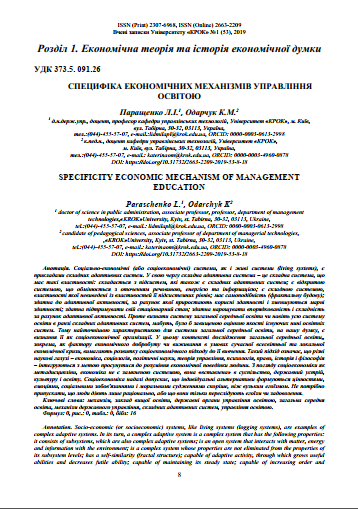SPECIFICITY ECONOMIC MECHANISM OF MANAGEMENT EDUCATION
DOI:
https://doi.org/10.31732/2663-2209-2019-53-8-18Keywords:
mechanism, higher education, state education authorities, secondary education, governance mechanism, complex adaptive systems, management educationAbstract
Socio-economic (or socioeconomic) systems, like living systems (logging systems), are examples of complex adaptive systems. In its turn, a complex adaptive system is a complex system that has the following properties: it consists of subsystems, which are also complex adaptive systems; is an open system that interacts with matter, energy and information with the environment; is a complex system whose properties are not eliminated from the properties of its subsystem levels; has a self-similarity (fractal structure); capable of adaptive activity, through which grows useful abilities and decreases futile ability; capable of maintaining its steady state; capable of increasing order and complexity due to adaptive activity. However, recognizing the system of general secondary education, or even the whole system of education in the rank of complex adaptive systems, would probably be an overestimate of the quality of existing educational systems. Therefore, the most accurate characteristic for the system of general secondary education, in our opinion, is recognition of it as a socio-economic organization. In this context, the study of general secondary education, in particular, as a factor of economic prosperity or survival in the context of the current global and local economic crisis, requires the development of a socio-economic approach to its study. Such an approach means that various branches of science - economics, sociology, political science, management theory, psychology, law, history and philosophy - are integrated with the aim of advancing to an understanding of human economic behavior. From the point of view of socioeconomics as metadiscipline, the economy is not a closed system, it is "inserted" into society, state structure, culture and education. Socioeconomics further assumes that individual alternatives are formed by values, emotions, social obligations and moral judgments rather than narrow selfishness. It is not necessary to assume that people act only rationally, or that they only pursue selfishness or pleasure.
Downloads
References
Шилова В. І. Державне регулювання ринку освітніх послуг в Україні : автореф. дис. на здоб. наук. ступеня канд. наук з держ. управл. : 25.00.02 / Гуманітарний ун-т «Запорізький ін-т держ. та муніципального управління». Запоріжжя, 2007. 20 с.
Яременко Л. М. Організаційно-економічні механізми державного управління вищою освітою в Україні: автореф. дис. на здобуття наук. ступеня канд. екон. наук: спец. 08.00.03 / Науково-дослідний економічний ін-т. Київ, 2008. 20 с.
Балыхин Г. А. Управление развитием образования: организационно-экономический аспект : научное пособие. Москва, 2003. 428 с.
Болдырева Н. В. Совершенствование организационно-финансового механизма системы общего образования на основе инновационного подхода : на примере Оренбургской области: автореферат дис. на здобуття наук. ступеня канд. эконом. наук: 08.00.10 / Оренбург. гос. аграр. ун-т. Оренбург, 2008. 22 с.
Скоробогатова Ю. А. Развитие механизма обеспечения ресурсами системы общего образования в регионе : автореф. дис. на здобуття наук. ступеня канд. економ. наук: 08.00.05 / Байкал. гос. ун-т экономики и права. Иркутск, 2009. 23с.
Цырендоржиева Д. Ж. Организационно-экономический механизм развития общего образования в регионе : автореф. дис. на здобуття наук. ступеня канд. эконом. наук : спец. 08.00.05 / Рос. акад. гос. службы при Президенте РФ. Москва, 2006. 25 с.
Беляков С. А. Модернизация образования в России : совершенствование управления : науч. пособие. Москва, 2009. 437 с.
Каленюк І. С. Економіка освіти : навч.посіб. Київ, 2003. 316.с.
Падалка О. С., Каленюк І. С. Економіка освіти та управління : посібник. Київ, 2012. 184 с.
Беляков С. А. Новые лекции по экономике образования: учебник. Москва, 2007 г. 424 стр.
Беляков С. А. Основные положения нового организационно-экономического механизма в системе общего образования : российская политическая энциклопедия (РОССПЭН) Москва, 2003. 176 с.
Ерошин В. И. Экономический механизм в общем образовании: автореф. дис. на здобуття наук. ступеня доктора эконом. наук : 08.00.05 / МГУ им. М.В. Ломоносова. Москва, 1997. 34 с.
Бочарникова И. В. Модернизация экономического механизма общего образования в условиях рыночных преобразований : автореф. дис. на здобуття наук. ступеня канд. эконом. наук: 08.00.05 / Рос. гос. пед. ун-т им. А.И. Герцена. Санкт-Петербург, 2003. 18 с.
Вифлеемский А. Б. Организационно-экономический механизм в общем среднем образовании России : автореф. дис. на здобуття наук. ступеня доктора эконом. наук : 08.00.05 / Моск. гос. ун-т им. М.В. Ломоносова. Москва, 2006. 46 с.
Цырендоржиева Д. Ж. Организационно-экономический механизм развития общего образования в регионе : автореф. дис. на здобуття наук. ступеня канд. эконом. наук : спец. 08.00.05 / Рос. акад. гос. службы при Президенте РФ. Москва, 2006. 25 с.
Leo Hurwicz, Roger Myerson, Eric Maskin. Теория экономических механизмов (Нобелевская премия по экономике 2007г. часть №1). URL : http://institutiones.com/teories/259-207-1.html/.


